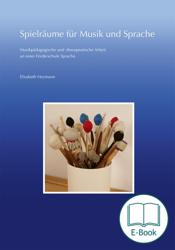During her many years as a music teacher and music therapist at a special school for speech and language, she has developed playful and creative music methods. Exciting music games for the group that give space to the children's emotions form a focal point alongside music therapy case histories from individual therapies. Information is provided on language development and language support for children whose language is not developed in line with their age. It will become clear how music can support communication in many ways and bring children with different language abilities together. The topic of opportunities and limitations of therapeutic work in schools will be discussed.
This book aims to inspire children to make music: Playing sounds, finding rhythms, expressing themselves and communicating. A variety of educational and therapeutic methods have been developed from the joy of creative, playful interaction with music.
All children enjoy making music - this book is particularly concerned with children who cannot express themselves in the same way as other children, who have language problems or who speak little. For these children, play spaces for music and language are a special opportunity to support them and make communication a success through play. This book is the result of twenty years of music work as a music teacher and music therapist at a special language school.
Questions about language development and language development delays are answered on the basis of practical experience, and the musical methods used in language support are explained. Music is suitable for bringing together children with very different language abilities and for achieving understanding through musical games.
Discovering spaces for music and creativity, for communication with and without language, for children's feelings - this book offers numerous practical examples.
How do silenced children find their voice again?
How do out-of-tune children find their own sounds?
How do disturbed children find their way into interaction?
Playful musical methods can help to empathise with these children and make contact and relationships possible again. Educational-therapeutic music games are offered, sometimes exciting and dynamic, sometimes calm and demanding listening, sometimes testing communication and contact.
In addition to the music games for the group, therapy with individual children is a focal point of the book. Vividly described, sometimes touching case histories illustrate the music therapy work with the children. The special concept of Safe Place according to Katz-Bernstein is combined with music therapy.
The children's very different social-emotional problems are treated.
School should first and foremost enable learning. Without denying this pedagogical mission, there are niches in which room for manoeuvre can be discovered for a broader concern: Through creativity, expression of feelings, testing communication and contact with artistic means, children can be strengthened and educational work can be supported. The topic of the opportunities and limitations of therapeutic work in schools is discussed in detail.
The book is aimed at educational and therapeutic professionals in schools, in inclusion work and in all institutions with children of primary school age.
Elisabeth Heymann:
Jahrgang 1952
Studium für das Lehramt an Grund- und Hauptschulen mit dem Fach Musik
Fünf Jahre Tätigkeit an einer Grundschule, auch als Musiklehrerin
30 Jahre Lehrerin an einer Förderschule Sprache (Primarstufe), hauptsächlich mit dem Fach Musik
In dieser Zeit berufsbegleitende Ausbildung zur Musiktherapeutin an der Uni in Siegen mit der Zertifizierung durch die DMtG
Etwa 15 Jahre im pädagogischen Kontext der Förderschule auch musiktherapeutisch tätig
Zusätzliches Engagement an der Schule mit Instrumentalgruppen, Theaterspielen mit Musik, Gestaltung von Schulfeiern und verschiedenen schulkulturellen Projekten – dies alles für Kinder mit wenigen sprachlichen und musikalischen Voraussetzungen
Angebot von Workshops zu den beschriebenen musikpädagogisch-therapeutischen Methoden aus der beruflichen Tätigkeit


 Preface
Preface